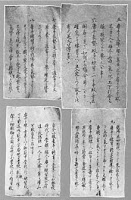And a martial system called Karate
And a martial system called Karate
Three Ryukyu Villages
Two Training Kata
And a martial system called Karate
On the 5th day of Training my Sensei gave to me:
Four Funakoshi Books
Three Ryukyu Villages
Two Training Kata
And a martial system called Karate
MUSASHI'S FIVE RINGS!
Four Funakoshi Books
Three Ryukyu Villages
Two Training Kata
And a martial system called Karate
Six Hojo Undo Tools
MUSASHI'S FIVE RINGS!
MUSASHI'S FIVE RINGS!
Four Funakoshi Books
Three Ryukyu Villages
Two Training Kata
And a martial system called Karate
Seven Bushido Virtues
Six Hojo Undo Tools
MUSASHI'S FIVE RINGS!
Four Funakoshi Books
Three Ryukyu Villages
Two Training Kata
And a martial system called Karate
On the 9th day of Training my Sensei gave to me:
Seven Bushido Virtues
Six Hojo Undo Tools
MUSASHI'S FIVE RINGS!
Four Funakoshi Books
Three Ryukyu Villages
Two Training Kata
And a martial system called Karate
On the 10th day of Training my Sensei taught to me:
Eight Budo Masters
Seven Bushido Virtues
Six Hojo Undo Tools
MUSASHI'S FIVE RINGS!
Four Funakoshi Books
Three Ryukyu Villages
Two Training Kata
And a martial system called Karate
On the 11th day of Training my Sensei taught to me:
Ten Itosu Precepts
Nine Kobudo Weapons
Eight Budo Masters
Seven Bushido Virtues
Six Hojo Undo Tools
MUSASHI'S FIVE RINGS!
Four Funakoshi Books
Three Ryukyu Villages
Two Training Kata
And a martial system called Karate
On the 12th day of Training my Sensei taught to me:
Eleven Makiwara Strikes
Ten Itosu Precepts
Ten Itosu Precepts
Nine Kobudo Weapons
Eight Budo Masters
Seven Bushido Virtues
Six Hojo Undo Tools
MUSASHI'S FIVE RINGS!
Four Funakoshi Books
Three Ryukyu Villages
Two Training Kata
And a martial system called Karate
Happy Holidays Everyone!
Don't forget to keep your eyes out for Santa!
Ðerm
Ͼ
Ͼ





















